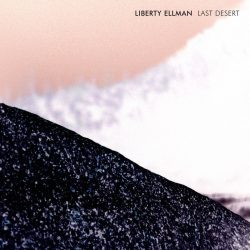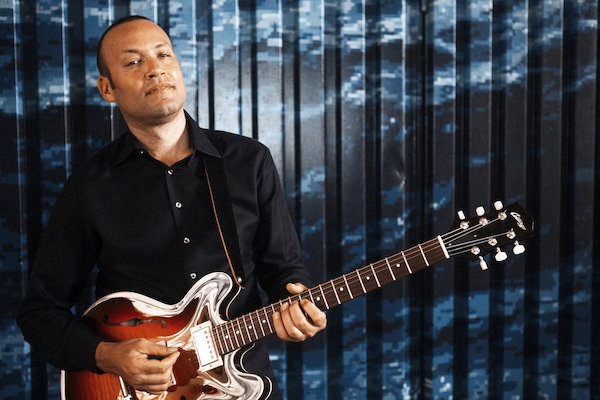Jazz Album Review: Liberty Ellman’s “Last Desert” — Going the Distance
By Steve Feeney
Last Desert proves that guitarist Liberty Ellman and his group can dance when they want to.
Last Desert, Liberty Ellman – guitar, Steve Lehman – alto saxophone, Jonathan Finlayson – trumpet, Jose Davila – tuba, Stephan Crump – bass, and Damion Reid – drums. PI Recordings

Despite displays of impressive musicianship, the adventurous wing of contemporary jazz often struggles to generate passion. Guitarist Liberty Ellman’s latest disc Last Desert comes closer — than most releases — to moving beyond the “mere” display of technique (though there’s plenty of that to dazzle here). The session serves up music that evokes emotions the listener can share.
Ellman and his stellar bandmates have been recording together for years under the guitarist’s leadership as well as on recordings led by Henry Threadgill, Steve Coleman, Myra Melford, and others. In fact, this disc feels sort of like a continuation of that brand of music-making — it is like sticking your head in during an endless session in progress and catching one of the high points.
Last Desert was inspired by Ellman’s reaction to 4 Deserts, an annual sports ultramarathon that traverses some forbidding international trails. Putting the craziness of the iron man heroics aside, the guitarist finds “hope” in the “will” and “tenacity” of the participants.
Ellman has surrounded himself with players ready to go the distance in a complementary and cooperative way. Steve Lehman (also sax), Jonathan Finlayson (trumpet), Jose Davila (tuba), Stephan Crump (bass), and Damion Reid (drums) all contribute — in large and small ways — to this engaging album.
The opening title piece (among the all-Ellman compositions) is a quiet, searching reflection that is used to introduce the players via a probing mix of their available sonorities. The guitarist melds in and out of the throng, giving the listener a taste (it is called “The Sip”) of what the album will offer. The title tune is broken into two parts, with Ellman guiding around the horns’ opening flourish. A rhythm trio, Ellman, Crump, and Reid, then supply a succession of subdued hues that the leader uses as a backdrop to display his linear gifts. The tempo lifts with a Findlayson solo that suggests miles-to-go in terms of exploratory possibilities. This piece could be nicely stretched out live.
Part II retreats back to a more reflective space and steadfast beat. Reid infuses bursts of energy through unleashed pulses, until Lehman cuts through the aura of uncertainty with his signature tough alto sound. Davila’s tuba engages briefly with the trumpeter as the group arrives at a compelling groove that suggests there’s much more to the band than heady chops. They can dance when they want to.

Liberty Ellman. Photo: courtesy of the artist.
“Portals” begins with subtle harmonies, flattened by Finlayson. Crump solos, taking us down a chilly, twisting corridor. The full band enters briefly, setting up a guitar/bass/drum trio interlude that emphasizes the leader’s chordal strengths. Trumpet and sax follow, with Finlayson and Lehman in full flight — with an assist from some churning rhythms. The result is an exciting slice of post-bop surge from a group that is willing to toss away formal restraints for the sake of toying with the spirit of uplift.
“Doppler” brings us back to Threadgill territory as the band marches by with a gangly high step. Ellman’s dampened solo leads to some stylish Lehman/Finlayson discourse that invites a collective conversation that canters to an abrupt end.
The very nice rolling harmony near the close of “Liquid” is a thing of beauty. Even the tuba sounds intimate. I have my preferences, and while these players work interestingly near the edge of the conventional, they are far more winning when they playfully cross over into less constricted zones.
Steve Feeney is a Maine native and attended schools in Maine, New Hampshire, and Massachusetts. He has a Master of Arts Degree in American and New England Studies from the University of Southern Maine. He began reviewing music on a freelance basis for the Portland Press Herald/Maine Sunday Telegram in 1995. He was later asked to also review theater and dance. Recently, he has added BroadwayWorld.com as an outlet and is pleased to now contribute to The Arts Fuse.

